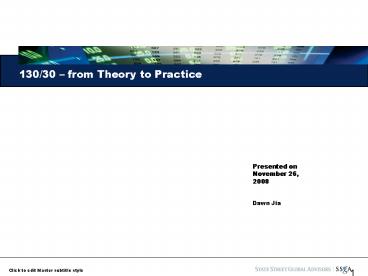Click to edit Master subtitle style - PowerPoint PPT Presentation
1 / 14
Title:
Click to edit Master subtitle style
Description:
Short Sale. Locates. 13. Working with the Prime Broker ... Shares must be sourced and borrowed; cash proceeds for the sale held in segregated accounts ... – PowerPoint PPT presentation
Number of Views:209
Avg rating:3.0/5.0
Title: Click to edit Master subtitle style
1
130/30 from Theory to Practice
Presented on November 26, 2008 Dawn Jia
Click to edit Master subtitle style
2
Agenda
- 130/30 Theoretical Background
- 130/30 Practical Considerations
3
130/30 Theoretical Background
4
130/30 Strategy 101
Strategy Definition
- A family of strategies that seeks to enhance the
alpha opportunity of a long-only portfolio by
partially relaxing the short constraint within a
risk controlled framework.
5
Theory Behind the 130/30 Approach
Fundamental Law of Active Portfolio Management
Number of stocks that managers can express their
views
Information Ratio - measure portfolio performance)
Information Coefficient - measure managers skill
Transfer Coefficient - measure how much of the
mangers insights can be reflected into portfolios
6
Theory Behind the 130/30 Approach
Negative Impact of the Portfolio Constraints
- Constraints prevent managers skills from being
fully reflected in the portfolio positions - Turnover
- Market capitalization
- Asset and sector bonds
- Long-Only
- Investors can significantly improve the transfer
of manager skill to portfolio positions by
removing the long-only constraint - 10-20 improvement in information ratio by
removing long-only constraint - 10-15 increase in expected excess return
7
Limitations of Long Only Portfolios
Portfolio Positions Do Not Reflect the Full Range
of Manager Skills
Sample Monthly Returns by Quintile
()
Long only strategies focus on potential
outperformers
Strategies that short can capitalize on potential
underperformers
Best 20 Worst 20
Measured over the period Jan 1990 to Dec 2006,
Investable Universe (SP/TSX Composite Index)
8
Limitations of Long Only Portfolios
Underweights Are Limited to Each Securitys
Benchmark Weight
Stock Weights in the TSX Composite Index
Only 43 out of 244 (or 18) stocks have index
weights greater than 0.50
As of September 30, 2008
9
Benefits of the 130/30 Approach
Traditional Active Management Improved Through
Selective Short Selling
- Allow active managers to better reflect insights
regarding potential winners and losers - Increase the opportunity sets
- Incorporate short positions which offset and
provide funding for additional long positions - Increased the ability to reflect both positive
and negative views into portfolio positions - Opportunity for higher risk adjusted returns
- More efficient use of risk budget
- Consistent with traditional asset allocation
classifications - 100 exposure to equity market
10
Choose the Leverage Ratio
Clarke, de Silva, Sapra, and Thorley Framework
11
130/30 Practical Considerations
12
Shorting Stocks
Shorting Stocks Needs to Engage a Prime Broker
Short Sale
Fund
Security Markets
Locates
Delivery of Security
Loan of Securities
Prime Broker
Custody Bank
Cash from Short Sale
Cash Collateral
13
Working with the Prime Broker
The prime broker is essential in strategies that
employ shorting
- Role is quite different from traditional broker
buying and selling - Shares must be sourced and borrowed cash
proceeds for the sale held in segregated accounts - Positions must be marked-to-market on a daily
basis - Change in status, such as corporate actions,
mergers, spin-offs, must be properly handled on
behalf of the short seller - The role of custody is split between the prime
broker and the fund administrator - Prime broker fees must be negotiated
14
Managing the Risk
The Risk Should be Managed as an Integrated
Portfolio
- Careful monitoring is required
- Additional skills are needed to control risk
- Returns can be more volatile than those in
unlevered portfolios - Diversification is key

